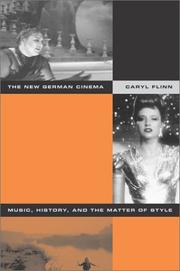| Listing 1 - 2 of 2 |
Sort by
|
Book
ISBN: 0520957172 9780520957176 9780520235779 0520235770 Year: 2013 Publisher: Berkeley
Abstract | Keywords | Export | Availability | Bookmark
 Loading...
Loading...Choose an application
- Reference Manager
- EndNote
- RefWorks (Direct export to RefWorks)
Edgar G. Ulmer is perhaps best known today for Detour, considered by many to be the epitome of a certain noir style that transcends its B-list origins. But in his lifetime he never achieved the celebrity of his fellow Austrian and German émigré directors-Billy Wilder, Otto Preminger, Fred Zinnemann, and Robert Siodmak. Despite early work with Max Reinhardt and F. W. Murnau, his auspicious debut with Siodmak on their celebrated Weimar classic People on Sunday, and the success of films like Detour and Ruthless, Ulmer spent most of his career as an itinerant filmmaker earning modest paychecks for films that have either been overlooked or forgotten. In this fascinating and well-researched account of a career spent on the margins of Hollywood, Noah Isenberg provides the little-known details of Ulmer's personal life and a thorough analysis of his wide-ranging, eclectic films-features aimed at minority audiences, horror and sci-fi flicks, genre pictures made in the U.S. and abroad. Isenberg shows that Ulmer's unconventional path was in many ways more typical than that of his more famous colleagues. As he follows the twists and turns of Ulmer's fortunes, Isenberg also conveys a new understanding of low-budget filmmaking in the studio era and beyond.
Motion picture producers and directors --- Ulmer, Edgar G. --- Sehested, Ove H., --- Ullmer, E. G. --- Warner, John, --- Ulmer, Edgar G. -- (Edgar George), -- 1904-1972. --- Motion picture producers and directors -- United States -- Biography. --- Sehested, Ove H. --- Warner, John --- 20th century directors. --- american films. --- austrian american. --- austrian directors. --- auteur theory. --- b movies. --- detour. --- directors. --- eclectic films. --- emigre directors. --- film criticism. --- film director. --- film history. --- film noir. --- film. --- filmmaker. --- genre films. --- german directors. --- hollywood career. --- hollywood. --- horror films. --- jewish film directors. --- low budget productions. --- minority audience. --- movies. --- noir. --- people on sunday. --- performing arts. --- personal life. --- ruthless. --- sci fi films. --- studio era. --- the black cat. --- unconventional.

ISBN: 9786612359705 0520937155 1597347736 1282359703 9780520937154 1417520027 9781417520022 0520228952 9780520228955 9781597347730 9781282359703 0520238230 9780520238237 6612359706 Year: 2004 Publisher: Berkeley : University of California Press,
Abstract | Keywords | Export | Availability | Bookmark
 Loading...
Loading...Choose an application
- Reference Manager
- EndNote
- RefWorks (Direct export to RefWorks)
When New German cinema directors like R. W. Fassbinder, Ulrike Ottinger, and Werner Schroeter explored issues of identity-national, political, personal, and sexual-music and film style played crucial roles. Most studies of the celebrated film movement, however, have sidestepped the role of music, a curious oversight given its importance to German culture and nation formation. Caryl Flinn's study reverses this trend, identifying styles of historical remembrance in which music participates. Flinn concentrates on those styles that urge listeners to interact with difference-including that embodied in Germany's difficult history-rather than to "master" or "get past" it. Flinn breaks new ground by considering contemporary reception frameworks of the New German Cinema, a generation after its end. She discusses transnational, cultural, and historical contexts as well as the sexual, ethnic, national, and historical diversity of audiences. Through detailed case studies, she shows how music helps filmgoers engage with a range of historical subjects and experiences. Each chapter of The New German Cinema examines a particular stylistic strategy, assessing music's role in each. The study also examines queer strategies like kitsch and camp and explores the movement's charged construction of human bodies on which issues of ruination, survival, memory, and pleasure are played out.
Motion picture music --- Motion pictures --- History and criticism. --- Background music for motion pictures --- Film music --- Movie music --- Moving-picture music --- Dramatic music --- Music --- Film scores --- 791.43 --- camp --- Caryl Flinn --- Duitsland --- Fassbinder Rainer Werner --- film --- film en geschiedenis --- filmgeschiedenis --- kitsch --- Kluge Alexander --- Ottinger Ulrike --- Treut Monika --- twintigste eeuw --- von Praunheim Rosa --- 82:791.43 --- 82:791.43 Literatuur en film --- Literatuur en film --- History and criticism --- Cinéma --- Film, Musique de --- Histoire et critique --- cinema historians. --- contemporary germany. --- famous films. --- film buffs. --- film students. --- film styles. --- film textbooks. --- german cinema. --- german cinematic style. --- german culture. --- german directors. --- german music. --- germany. --- historical contexts. --- historical review. --- kitsch. --- music styles. --- music. --- national identity. --- new german cinema. --- nonfiction. --- personal identity. --- political identity. --- r w fassbinder. --- sexual identity. --- transnational contexts. --- ulrike ottinger. --- werner schroeter.
| Listing 1 - 2 of 2 |
Sort by
|

 Search
Search Feedback
Feedback About UniCat
About UniCat  Help
Help News
News